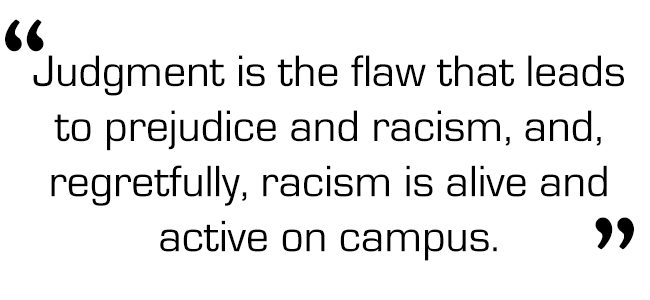Diversity (or something like it) part II
The meaning of Spartan life
October 9, 2014
Last week, “a black kid who grew up in the suburbs of Wisconsin” talked about the issue of racism on campus. That self-proclaimed “black kid” was sophomore Stephen Kolison, a fellow columnist and personal friend of mine.
I hate race. I hate race as a concept, and I hate even more how humanity has bastardized it to perpetuate disparity between people. But I cannot deny its existence; to do so would be naïve. So let’s air out the room a bit.
I’m a white kid from the suburbs of Ohio with a Middle Eastern heritage. I’m not “colorblind”; I see race. To not see skin color would be a gross injustice to the other party. Let me clarify. In order to not strip an individual of his heritage and distinct identity, one must consider skin color and ethnicity.
How one experiences the world is predicated upon physical appearance, so it would also be ignorant to neglect the power of race. However, I do believe that race has nothing to do with individuality outside the system of perpetuated ignorance we call society.
Because a person was born with dark skin, something wholly out of his control, why should he be deemed inferior? Is he different? Depending on your perspective, perhaps he is. But is he inferior or sub-human? Absolutely not.
The Oxford English Dictionary defines race as “the fact or condition of belonging to a particular people or ethnical stock; the qualities, etc. resulting from this.” It defines black as “having an extremely dark skin; strictly applied to Negroes and other dark-skinned races.”
Now that we’ve established some definitions, let’s do a little logic. If a person is considered black, then it is established that he is of a dark-skinned race. If he is of a dark-skinned race, then he belongs to a particular ethnic people with certain qualities.
The underlying assumption here is that a member of said “black race” is a human being. Now I ask, what makes a black human being different from a non-black human being?
I’d love to know what the inherent difference between a homo sapiens with black skin and a homo sapiens with white skin is. Someone, anyone, please tell me. If you do you’ll shatter everything I believe about human beings and likely end up winning a Nobel Prize for defying the laws of genetics and revolutionizing scientific nomenclature.

Actually, science offers a wonderful explanation for blackness. The principle of natural selection in evolutionary biology would suggest that darkened skin pigmentation is an adaptation to control ultraviolet radiation from the sun. But wait, there’s more. There exists a direct correlation between geographic exposure to these harmful rays and skin pigmentation.
For example, African-American is a term that has been used to describe black Americans because many can trace ancestry lines to Africa. Most interestingly, the continent is home to the world’s largest hot desert and numerous jungle climates, and the equator runs right through it. I’ll leave it to the reader to draw conclusions from here.
The qualities which result from a racial condition are simply that: qualities. In practice, race has only as much power as we give it. The unfortunate reality is that the philosophical concept of the “other” is a strong factor in human behavior because man struggles in the face of difference. Difference and otherness cause disorder and discontent. In our attempt to reorder our worlds, we learn judgment.
But we are presumably not the masses here at Case Western Reserve University. We are, presumably, in pursuit of something higher—an education—only we don’t check human nature at the classroom door, and judgment seeps in. Judgment is where we screw it all up. Judgment is the flaw that leads to prejudice and racism, and, regretfully, racism is alive and active on campus.
I too am human and therefore subject to the imperfection of judgment. However, I judge a person based on what’s between the ears and behind the eyes, not how big the ears or what color the eyes. In this respect, I don’t see skin color because the experiences and qualities that stem from race flower as personality and character.
Dr. Martin Luther King Jr. died trying to instill this sentiment in America. I can still hear his unwavering voice from recordings: “I have a dream that my four little children will one day live in a nation where they will not be judged by the color of their skin but by the content of their character.”
With widespread race issues as recent as the unrest in Ferguson, Missouri, still plaguing us, Dr. King’s words should mean so much more on a college campus where freedom and safety to speak and act out ought to be givens. We should stand for change, not in front of it.
I never thought I’d have to write about race here in my column. Over the past few weeks, that day has come and our community is marred. It is a sad day at Case Western Reserve University, and we are all to blame.
Jacob Martin is one of The Observer’s weekly opinion columnists. “Some Negroes lie, some are immoral, some Negro men are not be trusted around women—black and white. But this is a truth that applies to the human race and to no particular race of men.” —Harper Lee, To Kill a Mockingbird


